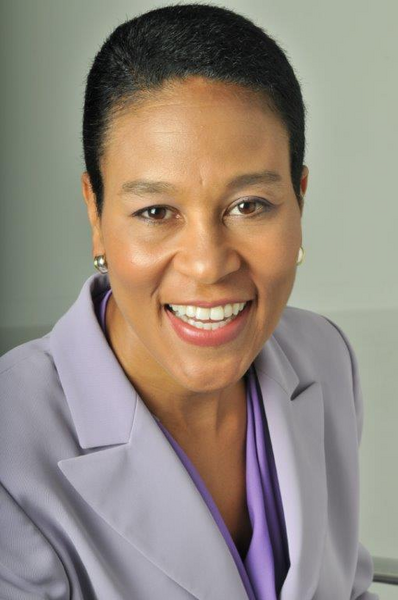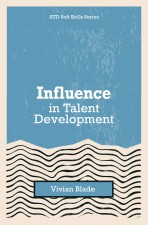ATD Blog
Influence in Talent Development: Q&A With Vivian H. Blade
Tue Nov 02 2021

Talent development professionals have a tremendous opportunity to influence at a deeper level—with learners, SMEs, and stakeholders—to achieve business and learning results. This book considers what it means to influence in general and in the TD context; how to use your ability to influence tactically and strategically; how to overcome barriers to success; and how you can be more impactful and empathetic.
Influence in Talent Development, part of the ATD Soft Skills Series, considers what it means to influence in general and in the TD context; how to use your ability to influence tactically and strategically; how to overcome barriers to success; and how you can be more impactful and empathetic. We recently spoke with author Vivian Blade to get some insights on key takeaways from the book.
What motivated you to write about influence?
Within the context of work and professional development, influence is being recognized as a critical skill for everyone to develop and apply. It shows up every day in all aspects of our lives. Whether or not we are aware of that skill in ourselves, our ability to influence dictates our success in our role and in our career progression. Yet, many professionals lack confidence in their ability to influence. I’ve found that to be especially true for women. I wanted to change that for people.
Talent development is in a unique position to have a tremendous impact on organizations. I wrote this book to help readers step into this role and untap their potential. This book gives you a roadmap for how to become that person of influence who has a greater impact on people’s lives and the organizations you work with and lead.
What does it mean to influence?
When you influence, you offer your ideas and perspectives to move someone to a mutually beneficial outcome in their actions, behavior, opinions, or beliefs. In the book, I introduce five principles of influence in the SCALE framework (social capital, courage, authenticity, leaning in with passion, and engaging a diverse and inclusive workplace community). So, to influence means to make consistent investments in growing relationships built on a foundation of empathy, genuine concern, respect, and trust; to show courage when facing uncertainty; to be authentic in your interactions with others; to exude passion and always give your best effort; and to invite, welcome, and engage people’s uniqueness to inspire an inclusive workplace.
Note what I’ve left out of my conception of influence. Influence does not mean coercing someone into doing your bidding. It is not Machiavellian or deceitful. Most people will be astute enough to see through such manipulation, which will do great damage to your ability to influence. Influence is also not instant or transactional. While such tactics may result in a temporary gain, they often lead to damaged relationships, leaving others with feelings of embarrassment, frustration, disgust, and even anger.
Ultimately, influence is more about how you live than what you do. Influence goes beyond the tactic you choose to use to win someone over. The values and motivations that drive how you live manifest in your words, behavior, and choices, all of which affect how you influence.
What is the connection between talent development professionals and the influence skill?
Talent development professionals touch every aspect of the business, and they make a point of getting to know employees at all levels of the organization. We are champions for employees to ensure they have the resources they need to develop and grow. We shape talent development initiatives to align with business priorities, enable future organizational readiness, and impact operational results. In this way, we are forward thinkers, innovators, and change agents. To succeed in any of this requires influence skills.
Supporting organizations and the professionals within them as they become their best selves is why talent development professionals are so committed to their work. While you can often see the potential in someone, that person has to be able to see that potential and realize it within themselves. You can give people all the strategies for growth and argue why a change in behavior or applying the hottest new tool will make all the difference, but you can’t make them change or do it for them. Your best actions are to influence and inspire.
Why is this book relevant in today’s professional climate?
Effects of the pandemic and technological advances have accelerated the need to reskill the workforce. Developing influence skills is at the top of list of development areas leaders have identified for themselves and their employees. It is the perfect time to reset on what it means to influence in the workplace and understand that we must be more deeply effective at this skill to become a person of influence rather than simply relying on choosing the right influence tactics when needed.
Let me draw attention to a few trends. First, organization design is moving more toward cross-functional teams, with more remote or hybrid work arrangements. Talent development is at the forefront of influencing how organizations and the talent within them can adapt. Second, diversity, equity, and inclusion is becoming a strategic priority for many organizations. Talent development’s role will be integral to leading this effort with passion and influencing sustainable culture change. Third, with ongoing global economic uncertainty, businesses will continue to look long and hard at their budgets, particularly for support functions, which is how executives see talent development. Having all the right data may not be enough to save your position; it also takes influence skills to support your case.
Why is it important to consider ethics in influence?
Each of us has a responsibility not to take advantage of those we influence but to inform and invite. You must consider what is ethical in your eyes and what is ethical in the eyes of the individuals you are engaging and within the culture and environment in which you are operating.
While recognizing that the intent in influencing is to move people, also recognize that there is power in influencing. It is important to use that power carefully and responsibly. How you use influence calls you to be accountable. Your influence can help or hurt, inspire or incite, empower or destruct. Your influence has consequences on other people’s lives and livelihood as well as your own. Your influence should have a conscience.
How can you elevate your influence when not in a position of authority?
Seeking influence without authority is a situation many talent development professionals often find themselves in. Whether early in your career or a seasoned professional, you communicate and influence across all levels of the organization. While you may most commonly influence at a peer level or with your boss where your daily interactions take place, there are times when you need to influence more senior leaders, perhaps to make a financial investment. You may influence the beliefs and behaviors of others through training and coaching programs, or you may influence subject matter experts to share their knowledge during the instructional design or job design.
What are some ways to develop your influence skills?
I center growing your influence through the five principles in the SCALE framework. A good place to start is with awareness—both your awareness of your current skills and what you hope to achieve through influence—and how others perceive you as a person of influence. I offer some resources in the book to begin an accelerated transformation.
It helps to break down this multiangle assessment by the five principles. Let’s take social capital as an example. As I write in the book, the characteristics of social capital include the value you add to relationships, your selflessness, the respect and trust you give and earn, and your long-term outlook. From there, you can grow your influence by proactively reaching out to others and being curious about what’s going on in their professional and, if appropriate, their personal lives. This will allow you to find commonalities in your lived experiences. The clincher is to seek how you can add value (without expectation of immediate return). Because you’ve built trust through reliable experiences, a deeper level of influence is possible.

About the Author
Vivian Hairston Blade is recognized as one of Engagedly’s Top 100 Global HR Influencers of 2021. As the president and CEO of Experts in Growth Leadership Consulting, she works with the world’s top brands, equipping leaders to build better, more resilient workplaces that thrive despite insurmountable odds. She helps companies solve the pressing burnout, turnover, and workplace culture challenges that they’re struggling with right now. She is a frequent keynote speaker, delivering transformative leadership development programs, executive coaching, and corporate consulting. She also works as adjunct faculty for the University of Louisville College of Business. In addition to Influence in Talent Development, Vivian is the author of Fuel Forward: Discover Proven Practices to Fuel Your Career Forward and Resilience Ready: The Leader’s Guide to Thriving Through Unrelenting Crises.
About ATD and ATD Press
The Association for Talent Development (ATD) is the world’s largest association dedicated to those who develop talent in organizations. ATD’s members come from more than 120 countries and work in public and private organizations in every industry sector. ATD Press publications are written by industry thought leaders and offer anyone who works with adult learners the best practices, academic theory, and guidance necessary to move the profession forward. For more information, visit td.org/books.

Influence in Talent Development
ISBN: 9781952157530 | 192 Pages | Paperback
https://www.td.org/book/influence-in-talent-development
To order books from ATD Press, call 800.628.2783.
To schedule an interview with Vivian Blade, please contact Kay Hechler, ATD Press senior marketing manager, at [email protected] or 703.683.8178.
You've Reached ATD Member-only Content
Become an ATD member to continue
Already a member?Sign In
